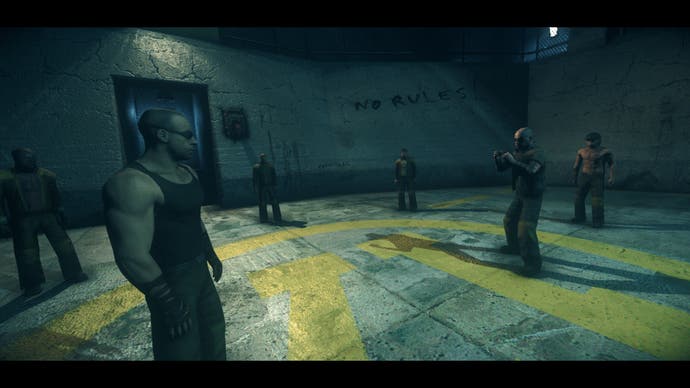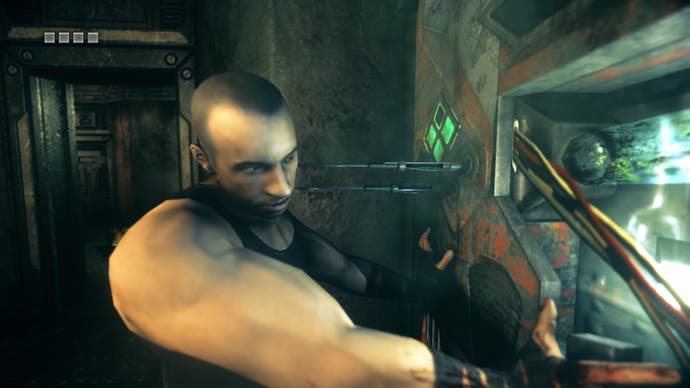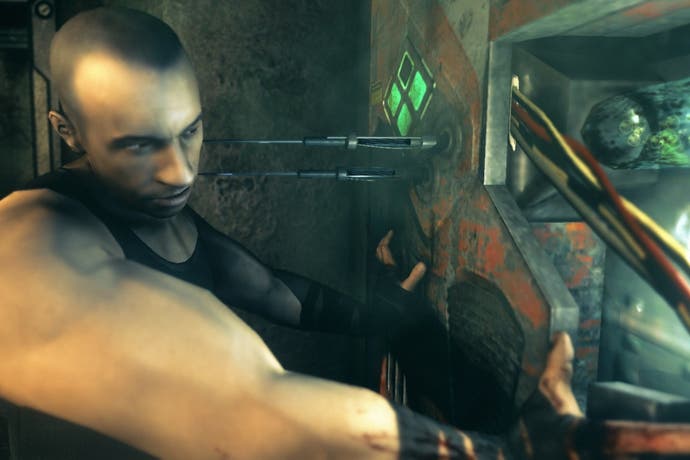The Chronicles of Riddick: Escape from Butcher Bay retrospective
Vin-dicated.
Sat amid a swarm of at best mediocre tie-ins, and at worse soulless cash-grabs, The Chronicles of Riddick: Escape from Butcher Bay stood as a gleaming inverse in a world of film adaptations. Not only was it undeniably good, but it was an adaptation of the small-budget Pitch Black, and even if you consider the at-the-time upcoming bigger-budget blockbuster set in the same universe, it's hard not to feel that the game wouldn't even exist if Vin Diesel hadn't been such a huge fan of both games and the character.
Even still, it's an odd game. Equal parts Thief and Doom, Butcher Bay has you alternate between sneaking around and being the thing that men are scared of in the dark, and picking up heavy ordinance to blast away in firefights as you made your way through the complex. Somehow, it manages to be all things to all men, for the most part.
It starts with a fantasy, which seems more than a little appropriate. Riddick, brought to the prison complex in more than a few chains and shackles, escapes, kills his captor, and then goes on a spree that serves as a tutorial and a playground, showing off his psychopathic bent and acting as a high-octane opening to a game that actually starts with a slow burn. Just before you reach the shuttle that'll take you off world, you're woken up as the transport carrying you to Butcher Bay begins its landing pattern.
Starbreeze are tapping you on the shoulder and looking almost incredulous. Did you really think it was going to be that easy?
It's about telling you two things. The first is that the kind of escape that becomes myth and legend, even if it's within the admittedly obscure universe of the Riddick films, is not going to take ten minutes, or even an hour. The whole point of Butcher Bay is that it's inescapable, a complex in the middle of a desert on an empty planet in some forgotten part of the galaxy. The second is that you're not some kind of superman, despite the fact that you're playing within the bulk of Vin Diesel.

There's another moment, later in the game, that serves as almost the entire opposite purpose. Just before you get Riddick's trademark 'eye shine', which lets you see in the dark, you're forced to navigate your way through The Pit, which seems to be halfway between a sewage network and a radioactive waste dump. You have to clear your way through a bunch of mutants that come at you from the dark. With nothing but a dodgy flashlight to illuminate the way, you're left with little other option than to fear the dark.
It's smart design, and it's an elegance found in so many little touches in Butcher Bay. Before you get yourself a shank, you're attacked by inmates brandishing screwdrivers and sharpened bits of metal. It's about emphasising your vulnerabilities just before it closes them up, and having you switch places with your victims. At its most base, it's making you empathise with their position. Just before you bury the shank in their neck. Even the healing stations occupy this weird space between making you feel vulnerable and invincible, stabbing you repeatedly in the neck or the chest, before bolstering your health bars. You should be bleeding out, but you're fighting fit. You're moving up the food-chain, and now you have to deal with the guards, and all their assault rifles and shotguns.
And the higher up that chain you get, the further down into the Butcher Bay complex you're buried. As good as the opening few levels are in setting up the characters of the inmates and the precarious social structure that exists within the prison, it's the constant raising of the stakes where Riddick really shines. It's very much a case of constantly jumping from one frying pan into another, before diving headfirst into the fire. You're playing the galaxy's foremost escape artist, and so when you go from Max to Double Max to Triple Max before being buried in Cryosleep, you're pretty much just earning your stripes.
Going back to Riddick in this past week, what I find most impressive is the sense of pacing. Each time you force the prison to escalate the level of your incarceration, the status is all but reset; you lose your weapons, you lose all your knowledge of the area and how to beat it, and you're forced to ingratiate yourself with the inmates once more.

It means you have these bursts of action that punctuate the climax of each area, every one illustrated like a revenge fantasy, as you slaughter guards left and right and cut a swathe through the scenes of your recent oppression. More than anything, Starbreeze was successful in creating the claustrophobia of imprisonment, and even when you get to Double Max, the game's largest area, you only have to look up at the latticework of walkways and cells to realise that this isn't clean air you're breathing.
Even though it might feel like you've got a sky above you, the walls are higher than you can see. The darkness reinforces the theme, with the shadows not so much stretching as pooling, the blacks utterly impenetrable, to the extent where it's often impossible to even see the guards and inmates you kill if the light doesn't fall directly on their face. They're just anonymous victims, another reason for Riddick to be exactly where he is, and not on the outside. It's that very first murderous fantasy, telling you everything you need to know about the character. He might be a legend, but that doesn't mean he's a hero.
Five years after the original Butcher Bay was released, Starbreeze revisited it with Assault on Dark Athena, essentially another full game sold with an HD remake of the original. The problem here wasn't so much that it was bad, but it was missing that rhythm and social eye that had made Butcher Bay so compelling. You're still escaping increasingly ridiculous situations, but you're doing it on your own, with no neutral characters to either aid or hinder you. It's much more of a straight FPS, and when the oddity and weirdness of the original was what made it stand out so much, that left it feeling considerably less interesting.
Regardless of its filmic heritage, Riddick managed to straddle genres with more confidence than most games can muster for just the one. There are the occasional janky levels and odd difficulty spikes that are even more odd in these years of excessive accessibility, but its ability to make you feel simultaneously deadly, both from the shadows and out of them, and utterly vulnerable at all times is still a heady concoction that's all too rare.


